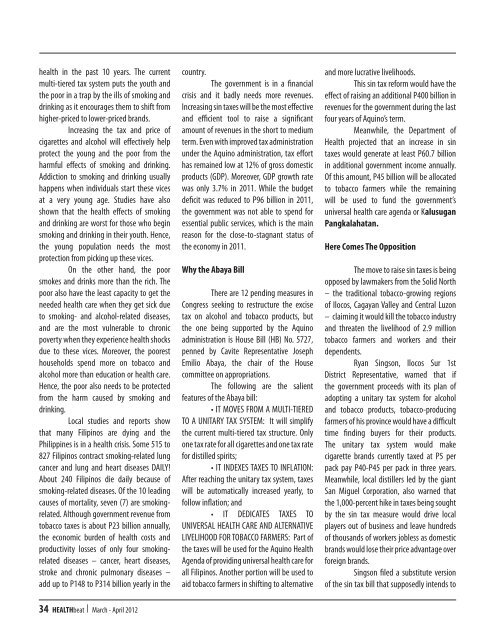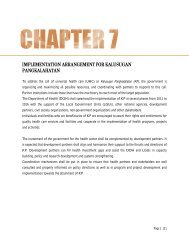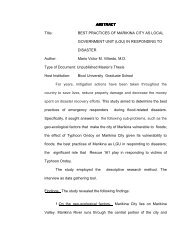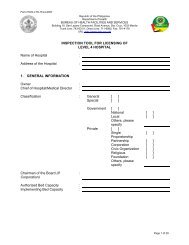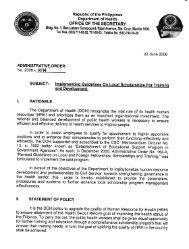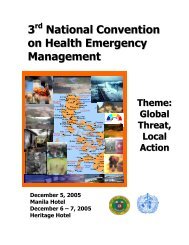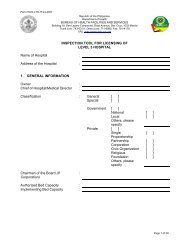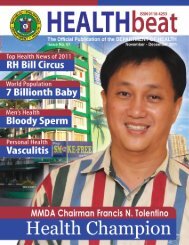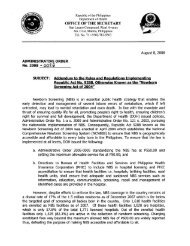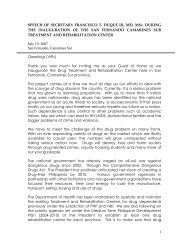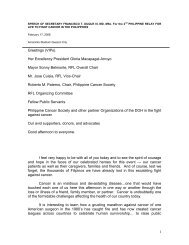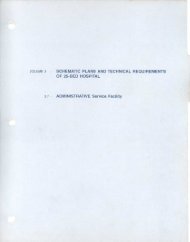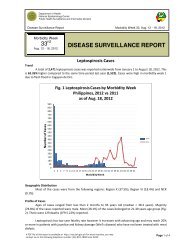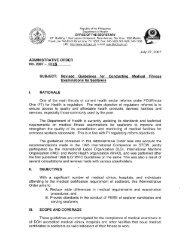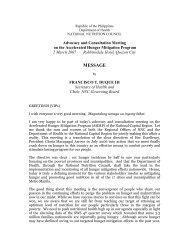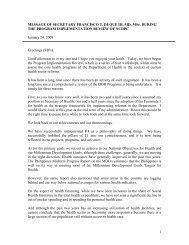Issue No. 69 - March - April 2012 - DOH
Issue No. 69 - March - April 2012 - DOH
Issue No. 69 - March - April 2012 - DOH
- No tags were found...
You also want an ePaper? Increase the reach of your titles
YUMPU automatically turns print PDFs into web optimized ePapers that Google loves.
health in the past 10 years. The currentmulti-tiered tax system puts the youth andthe poor in a trap by the ills of smoking anddrinking as it encourages them to shift fromhigher-priced to lower-priced brands.Increasing the tax and price ofcigarettes and alcohol will effectively helpprotect the young and the poor from theharmful effects of smoking and drinking.Addiction to smoking and drinking usuallyhappens when individuals start these vicesat a very young age. Studies have alsoshown that the health effects of smokingand drinking are worst for those who beginsmoking and drinking in their youth. Hence,the young population needs the mostprotection from picking up these vices.On the other hand, the poorsmokes and drinks more than the rich. Thepoor also have the least capacity to get theneeded health care when they get sick dueto smoking- and alcohol-related diseases,and are the most vulnerable to chronicpoverty when they experience health shocksdue to these vices. Moreover, the pooresthouseholds spend more on tobacco andalcohol more than education or health care.Hence, the poor also needs to be protectedfrom the harm caused by smoking anddrinking.Local studies and reports showthat many Filipinos are dying and thePhilippines is in a health crisis. Some 515 to827 Filipinos contract smoking-related lungcancer and lung and heart diseases DAILY!About 240 Filipinos die daily because ofsmoking-related diseases. Of the 10 leadingcauses of mortality, seven (7) are smokingrelated.Although government revenue fromtobacco taxes is about P23 billion annually,the economic burden of health costs andproductivity losses of only four smokingrelateddiseases – cancer, heart diseases,stroke and chronic pulmonary diseases –add up to P148 to P314 billion yearly in thecountry.The government is in a financialcrisis and it badly needs more revenues.Increasing sin taxes will be the most effectiveand efficient tool to raise a significantamount of revenues in the short to mediumterm. Even with improved tax administrationunder the Aquino administration, tax efforthas remained low at 12% of gross domesticproducts (GDP). Moreover, GDP growth ratewas only 3.7% in 2011. While the budgetdeficit was reduced to P96 billion in 2011,the government was not able to spend foressential public services, which is the mainreason for the close-to-stagnant status ofthe economy in 2011.Why the Abaya BillThere are 12 pending measures inCongress seeking to restructure the excisetax on alcohol and tobacco products, butthe one being supported by the Aquinoadministration is House Bill (HB) <strong>No</strong>. 5727,penned by Cavite Representative JosephEmilio Abaya, the chair of the Housecommittee on appropriations.The following are the salientfeatures of the Abaya bill:• IT MOVES FROM A MULTI-TIEREDTO A UNITARY TAX SYSTEM: It will simplifythe current multi-tiered tax structure. Onlyone tax rate for all cigarettes and one tax ratefor distilled spirits;• IT INDEXES TAXES TO INFLATION:After reaching the unitary tax system, taxeswill be automatically increased yearly, tofollow inflation; and• IT DEDICATES TAXES TOUNIVERSAL HEALTH CARE AND ALTERNATIVELIVELIHOOD FOR TOBACCO FARMERS: Part ofthe taxes will be used for the Aquino HealthAgenda of providing universal health care forall Filipinos. Another portion will be used toaid tobacco farmers in shifting to alternativeand more lucrative livelihoods.This sin tax reform would have theeffect of raising an additional P400 billion inrevenues for the government during the lastfour years of Aquino’s term.Meanwhile, the Department ofHealth projected that an increase in sintaxes would generate at least P60.7 billionin additional government income annually.Of this amount, P45 billion will be allocatedto tobacco farmers while the remainingwill be used to fund the government’suniversal health care agenda or KalusuganPangkalahatan.Here Comes The OppositionThe move to raise sin taxes is beingopposed by lawmakers from the Solid <strong>No</strong>rth– the traditional tobacco-growing regionsof Ilocos, Cagayan Valley and Central Luzon– claiming it would kill the tobacco industryand threaten the livelihood of 2.9 milliontobacco farmers and workers and theirdependents.Ryan Singson, Ilocos Sur 1stDistrict Representative, warned that ifthe government proceeds with its plan ofadopting a unitary tax system for alcoholand tobacco products, tobacco-producingfarmers of his province would have a difficulttime finding buyers for their products.The unitary tax system would makecigarette brands currently taxed at P5 perpack pay P40-P45 per pack in three years.Meanwhile, local distillers led by the giantSan Miguel Corporation, also warned thatthe 1,000-percent hike in taxes being soughtby the sin tax measure would drive localplayers out of business and leave hundredsof thousands of workers jobless as domesticbrands would lose their price advantage overforeign brands.Singson filed a substitute versionof the sin tax bill that supposedly intends to34 HEALTHbeat I <strong>March</strong> - <strong>April</strong> <strong>2012</strong>


